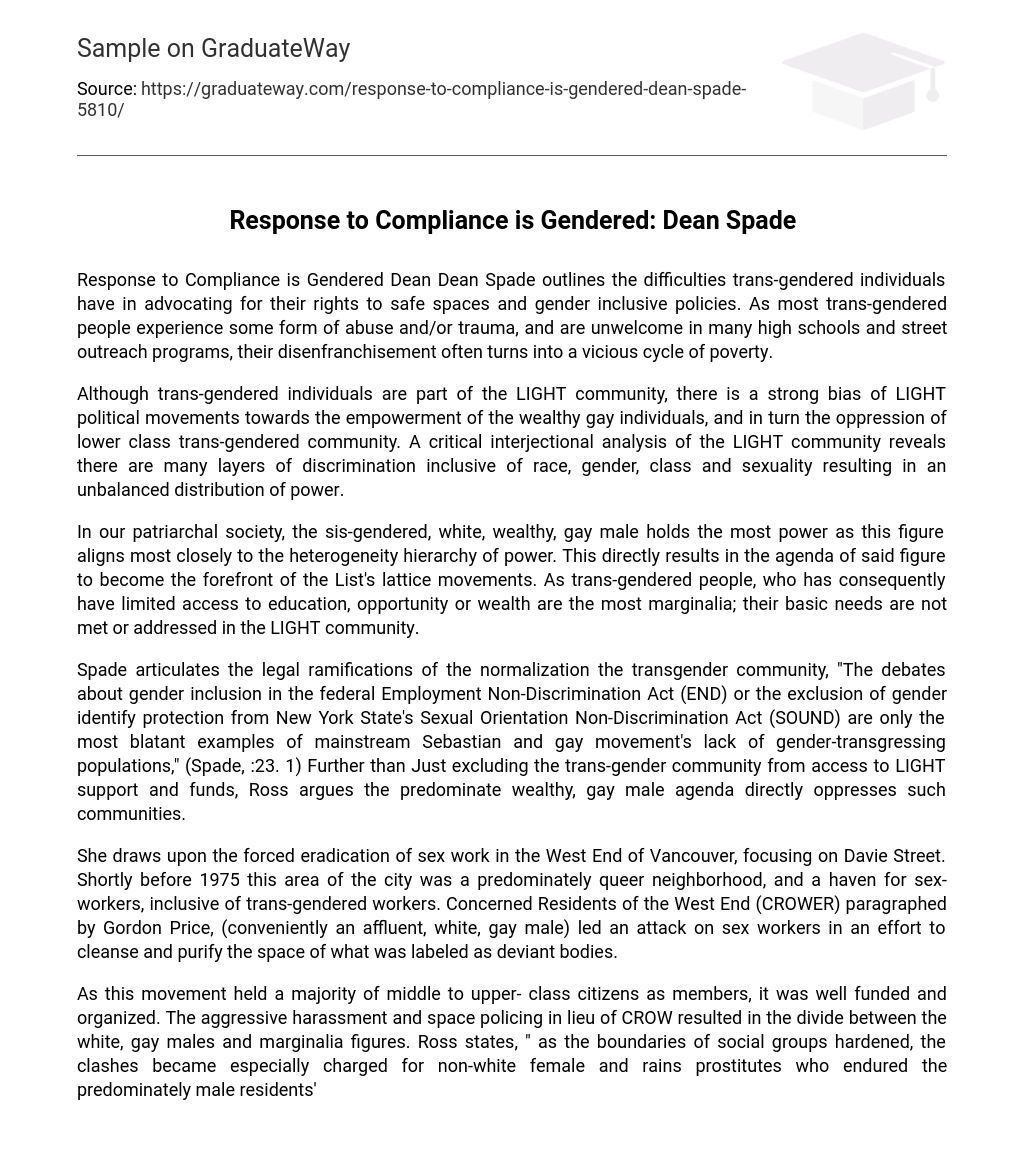Response to Compliance is Gendered Dean Dean Spade outlines the difficulties trans-gendered individuals have in advocating for their rights to safe spaces and gender inclusive policies. As most trans-gendered people experience some form of abuse and/or trauma, and are unwelcome in many high schools and street outreach programs, their disenfranchisement often turns into a vicious cycle of poverty.
Although trans-gendered individuals are part of the LIGHT community, there is a strong bias of LIGHT political movements towards the empowerment of the wealthy gay individuals, and in turn the oppression of lower class trans-gendered community. A critical interjectional analysis of the LIGHT community reveals there are many layers of discrimination inclusive of race, gender, class and sexuality resulting in an unbalanced distribution of power.
In our patriarchal society, the sis-gendered, white, wealthy, gay male holds the most power as this figure aligns most closely to the heterogeneity hierarchy of power. This directly results in the agenda of said figure to become the forefront of the List’s lattice movements. As trans-gendered people, who has consequently have limited access to education, opportunity or wealth are the most marginalia; their basic needs are not met or addressed in the LIGHT community.
Spade articulates the legal ramifications of the normalization the transgender community, “The debates about gender inclusion in the federal Employment Non-Discrimination Act (END) or the exclusion of gender identify protection from New York State’s Sexual Orientation Non-Discrimination Act (SOUND) are only the most blatant examples of mainstream Sebastian and gay movement’s lack of gender-transgressing populations,” (Spade, :23. 1) Further than Just excluding the trans-gender community from access to LIGHT support and funds, Ross argues the predominate wealthy, gay male agenda directly oppresses such communities.
She draws upon the forced eradication of sex work in the West End of Vancouver, focusing on Davie Street. Shortly before 1975 this area of the city was a predominately queer neighborhood, and a haven for sex-workers, inclusive of trans-gendered workers. Concerned Residents of the West End (CROWER) paragraphed by Gordon Price, (conveniently an affluent, white, gay male) led an attack on sex workers in an effort to cleanse and purify the space of what was labeled as deviant bodies.
As this movement held a majority of middle to upper- class citizens as members, it was well funded and organized. The aggressive harassment and space policing in lieu of CROW resulted in the divide between the white, gay males and marginalia figures. Ross states, ” as the boundaries of social groups hardened, the clashes became especially charged for non-white female and rains prostitutes who endured the predominately male residents’ sexist and racist belligerence,” (Ross, :202).
This divide arguably placed trans-gendered individuals as the other’ tactically distancing such group from the larger more affluent gay community. For example, trans-gendered sex workers were sensationalists and response to Compliance is Gendered: Spade By lively communities. The CROWER movement was promoted by government policy and eventually intrinsic to legal policy. Trans communities were spatially torn apart, sousing became inaccessible, their past efficacy of earning no longer available to them.
Thus resulting in the wealthy, white, gay male community predominately occupying the West End whilst leaving the trans-gendered community to fend for themselves, without social or legal support. The force and power of the white gay agenda allowed the complete disenfranchisement of trans-gendered peoples to become unquestioned by the majority. Spade argues that to change the undermining of the truly valuable movements for basic rights to be available to all, e must force the leaders of our communities to take a critical interjectional stance towards changing policy or else these needs remain unaddressed.
When one thinks of the main LIGHT legal and political movement at present, the legalization of gay marriage is at the forefront. Although this is an important movement towards equality, one must question why that is the predominant movement over the very basic, primary rights of trans-gendered individuals. While rights to shared property and spousal health coverage is beneficial to many, trans-gendered communities are trundling with basic protection rights to access employment, housing, and health.
Spade and Ross both argue that there is a hierarchy of power within the LIGHT community, resulting in bias gay agenda. The amendments to law only address the issues predominate to white middle-upper class citizens, especially white, gay males. The necessary movements toward the protection of the trans-gendered community are not gaining prominence in the LIGHT community because of the direct normalization and thus lack of funding, leadership and power.





